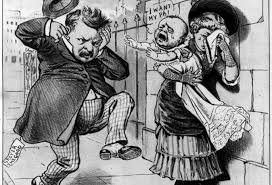by Peter Pavarini
A War of Words
Every time I think the emotional intensity of the current political environment couldn’t get any worse, we have another week like the one just passed. I often read that, by historical measures, nothing in the ongoing war of words is unprecedented.[i] However, far too many people I respect – both on the Left and Right – genuinely believe that things have gotten out of hand.
This has prompted me to dig a little deeper. As I’ve said before, I’m open to the possibility that America is at a breaking point – as it was in 1860.[ii]
When I was growing up in the 1950s and 1960s, I never once experienced the level of political animosity that is so common today. Long Island, where I lived for fourteen years, was as racially, ethnically, religiously and culturally diverse as any place in the United States at that time. Yet, politics rarely came up in conversations -not in school, the workplace or the wide range of social situations I found myself in. The only time kids like me heard an adult say what party they were affiliated with was during the few weeks leading up to an election (“Yeah, my parents voted for Nixon/Kennedy; who did yours vote for?”). As I remember, the mention of politics was normally met with adolescent disinterest but never with derision.
Little did I realize that the Fifties, Sixties and Seventies would later be seen as a “period of civility and bipartisanship”[iii], this despite the fact that we were grappling with issues like Vietnam, Civil Rights, and Watergate, to name only a few. Before then, political rhetoric was rather rough given the cultural mores of the time.

Political Animosity Through the Years
During the election of 1828, when Andrew Jackson ran against President John Quincy Adams, the candidates displayed extraordinary animosity toward each other including making accusations of murder, adultery and pimping. In the Cincinnati Gazette, one writer claimed that Jackson’s mother was a common prostitute brought to the U.S. by British soldiers. Once here, she married a mulatto man with whom she had several children, one of whom was General Jackson.[iv]
For much of the Nineteenth Century and even into the Twentieth Century, such outrageous, racially-charged language could be explained (although not excused) by the American electorate’s relatively low level of education. With no fact-checkers to counter such trash talk, candidates said things that seem tame compared to what we hear today.
Thanks to a popular Broadway play, most Americans now know that U.S. Vice President Aaron Burr killed Treasury Secretary Alexander Hamilton in a duel over disparaging remarks the latter made at dinner. So far, the only physical challenge any of the candidates for the Democratic nomination have made is Joe Biden’s claim that he could beat Trump in a push-up contest. Let’s hope that’s as wild as it gets before Election Day 2020.
The Impact of Electronic Media
Things changed, however, when the media began to differentiate along partisan lines allowing audiences to self-select the kind of bias they preferred. As we went from three national news networks to a myriad of cable, broadcast and on-line news outlets, it’s no wonder that TV producers and newspaper editors began to promote overheated rhetoric over straight news. Gaining viewers and readers took precedence over generating well-tempered, objective reporting.
As more and more people became firmly entrenched in either the “red camp” or the “blue camp”, political strategists had no choice but to re-focus their efforts. They told candidates, particularly those in a primary, to ignore the middle and “play to their base” using hyperbolic language and describing their opponents in the most unflattering terms.
So, Democrats took up the habit of routinely calling Republicans liars, fascists, racists, and perpetrators of voter suppression; while Republicans made a point of accusing Democrats of being socialists, un-American, anti-Semites and perpetrators of election fraud.
Now, how can average folks be expected to conduct an intelligent conversation about healthcare or immigration in such a hostile environment?
A Classic Struggle of Good Versus Evil
Surely, the media and political class have changed, but what about the American public?
The best answer I’ve found to that question comes from Alison McQueen, a Stanford University political science professor. She contends that, when people see themselves engaged in a classic struggle of good versus evil, they are more likely to resort to using terrible means to achieve their ends – starting with harsh words, all the way up to violence.[v] People are not content simply disagreeing with a viewpoint they find erroneous. They assume that for someone to reach a contrary position there must be something inherently defective about that person, i.e., they must be stupid, corrupt, or compromised by prejudice. Additionally, rather than trying to understand why someone reached a different conclusion, they find it easier to simply dismiss any opposing opinion as “hate speech”.
But why stop with simple character assassination? Why not extend every political dispute to global annihilation? How else can statements like “the world is gonna end in 2030 if we don’t address climate change” or “there will be no America if we don’t halt illegal immigration” be explained? Isn’t it ironic that, even as the Left becomes less religious, it remains as willing as the Right to employ apocalyptic language?
Perhaps the most invidious aspect of this schism is the widely held view (on both sides) that anyone we disagree with must hold beliefs that are the polar opposite of everything we believe in. For example, I know of no Progressive who would acknowledge that you can favor a revision of our country’s asylum laws and not be a racist. Likewise, how many Trump supporters would admit that the U.S. could preserve its sovereignty without building a wall on its southern border?
Unfortunately, in an era of invectives and ultimatums, common ground and common sense have become equally rare.
Bringing an End to the Rhetorical Arms Race
Is there any way to stop this craziness? I know those on the Left will say nothing will change until Trump is removed from office. Those on the Right hope a landslide Trump victory in 2020 will finally vanquish the Resistance that emerged after the 2016 election. I fear both sides are delusional.
What we are witnessing is far greater than a breakdown in communications between radically different political cultures. Cultural forces other than personal ideologies, identity politics and tribal loyalties have widened the gulfs separating us. Digital technologies have served as an accelerant for the fires that were smoldering before the Internet Age, but they can’t fully explain the vitriol and fury that continues to debase American society.
Our political system was designed to dampen such dangerous passions and compel both good and bad actors to work together and share responsibility for governing our country. Living together has always required people to seek compromise and find ways to resolve differences. It would help if politicians began the healing process by treating the public like grownups – even those undeserving of such treatment. At all levels of government, our elected leaders should be honest with us and explain that every important policy decision requires trade-offs. No, you can’t have Medicare for All without higher taxes, some degree of healthcare rationing, and an end to private insurance. Tax cuts without spending cuts invariably lead to budget deficits, at least in the short run, and that adds to a burgeoning national debt. As much as we’d like to show compassion to everyone who lives in poverty around the world, our ability to assimilate the countless millions who want to migrate to the U.S. is quite limited. Deregulation has its benefits, but in the long run a complex society such as ours cannot function without a reasonable level of governmental oversight.
Without question, the media bears a great deal of responsibility for the mess we are in. What comfort can be found in our First Amendment freedoms if the public has no reason to trust what media outlets portray as objective news? There has to be a profitable business model that allow companies to disseminate news without forcing facts to fit a predetermined biased narrative. I still believe most people want nothing to do with the ugly, crass, shallow discourse that has become today’s normal manner of speech. America cannot truly be great unless it pulls itself out of the gutter and again aspires to the rhetorical ambitions of its Founders.
[i] See, e.g., Bruce Thornton, “Insults and Personal Attacks Are the American Way, Newsweek, February, 7, 2016; Gregory Krieg, “Trump-Clinton Nasty? Not Compared to These Campaigns”, CNN, September 23, 2016.
[ii] “Truth or Consequences Today”, June 29, 2019; “Politics Through the Looking Glass”, June 1, 2019 at www.alessandrocamp.com
[iii] Kevin Modesti, “Hate speech or modern politics? New rhetoric revives tradition of all insults, all the time”, Daily News, April 29, 2019.
[iv] Reid Willis, “Political rhetoric: It’s not as bad as you think,” Loyola Phoenix, October 17, 2018.
[v] K. Chesley, “Stanford University political scientist studies apocalyptic political rhetoric,” https://news.stanford.edu, December 29, 2017.

I used to be recommended this web site through my cousin. I am now not sure whether or not this publish is written by way of him as nobody else know such detailed approximately my problem. You are amazing! Thanks!